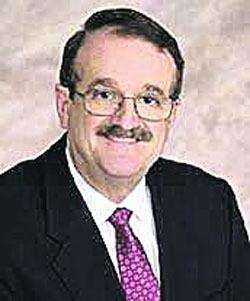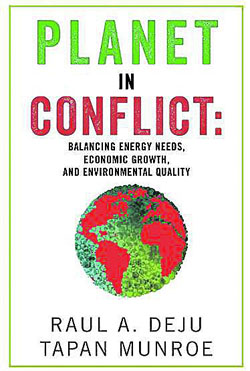 |
|
|
Raul A. Deju Photo provided
|
|
|
|
|
|
Local authors Raul A. Deju and Tapan Munroe wrote their book, "Planet in Conflict: Balancing Energy Needs, Economic Growth, and Environmental Quality," with a single purpose: to demonstrate that economic growth and environmental protection are intrinsically linked and can produce more wealth in a compassionate way.
 A geologist by training, Deju has served as chairman or CEO of major international public companies such as EnergySolutions, a provider of specialized, technology-based nuclear services. Munroe holds a doctorate in economics; he was a visiting scholar at the Massachusetts Institute of Technology and Stanford University, and a professor and chair of the Department of Economics at the University of the Pacific in Stockton.
A geologist by training, Deju has served as chairman or CEO of major international public companies such as EnergySolutions, a provider of specialized, technology-based nuclear services. Munroe holds a doctorate in economics; he was a visiting scholar at the Massachusetts Institute of Technology and Stanford University, and a professor and chair of the Department of Economics at the University of the Pacific in Stockton.
 "Tapan and I met in the community and had many common associates. I read his last book, 'Innovation: Key to America's Prosperity and Job Growth;' a lot of his ideas resonated with me. We have differences of opinion as to how to approach issues, but we believe in the same objectives," says Deju. (Munroe recently moved out of the area to be closer to his children for personal reasons - we could not reach him for this article.)
"Tapan and I met in the community and had many common associates. I read his last book, 'Innovation: Key to America's Prosperity and Job Growth;' a lot of his ideas resonated with me. We have differences of opinion as to how to approach issues, but we believe in the same objectives," says Deju. (Munroe recently moved out of the area to be closer to his children for personal reasons - we could not reach him for this article.)
 The two authors realized that in order to have environmental protection and social equity, economic growth was needed; and the biggest engine to economic growth is energy, directly and indirectly. The book explains that it's not about more or less taxes; it's not about the rich and the poor. "If economic growth does not take care of social equity and of the environment, we are all messed up," says Deju.
The two authors realized that in order to have environmental protection and social equity, economic growth was needed; and the biggest engine to economic growth is energy, directly and indirectly. The book explains that it's not about more or less taxes; it's not about the rich and the poor. "If economic growth does not take care of social equity and of the environment, we are all messed up," says Deju.
 "Planet In Conflict" is constructed in short chapters of four to five pages each that tackle specific topics, debunking myths with clarity and intellectual honesty. In the chapter "The Fresh Water Crisis is Growing," the authors discuss how uncontrolled growth around the world has already started to deplete one of our most valuable natural resources. The chapter, "U.S. Clean Energy Bubble is set to Burst," explains that clean energy solutions have been heavily subsidized to compete with cheaper fossil fuel options in the market place. When subsidies expire in the next few years, they say the bubble will burst, and since China is likely to continue to support the green sector, more jobs and promising growth will likely be lost in the U.S.
"Planet In Conflict" is constructed in short chapters of four to five pages each that tackle specific topics, debunking myths with clarity and intellectual honesty. In the chapter "The Fresh Water Crisis is Growing," the authors discuss how uncontrolled growth around the world has already started to deplete one of our most valuable natural resources. The chapter, "U.S. Clean Energy Bubble is set to Burst," explains that clean energy solutions have been heavily subsidized to compete with cheaper fossil fuel options in the market place. When subsidies expire in the next few years, they say the bubble will burst, and since China is likely to continue to support the green sector, more jobs and promising growth will likely be lost in the U.S.
 "It dawned on both of us that when people talk about energy they have a lot of misconceptions that come from the increased labeling of people and ideas," Deju says, adding it leads to decision-making based on political clientelism rather than facts. "When Reagan was president he could reach out to progressives, and when Clinton was president he could reach across the aisle; we were not as labeled in those periods of time as we are today."
"It dawned on both of us that when people talk about energy they have a lot of misconceptions that come from the increased labeling of people and ideas," Deju says, adding it leads to decision-making based on political clientelism rather than facts. "When Reagan was president he could reach out to progressives, and when Clinton was president he could reach across the aisle; we were not as labeled in those periods of time as we are today."
 Deju thinks that labeling when it comes to energy sources and economic growth is counterproductive. "Solar is not good and solar is not bad. Solar is a form of generating energy. It's not about whether Solyndra is a bad thing or fracking is a bad thing; there are a lot of things about nuclear or gas that make sense and others that don't," he says. "It's not about labeling one source or the other; it's about minimizing the amount of energy we use. People in this country have a tendency to supersize everything; it is not necessary."
Deju thinks that labeling when it comes to energy sources and economic growth is counterproductive. "Solar is not good and solar is not bad. Solar is a form of generating energy. It's not about whether Solyndra is a bad thing or fracking is a bad thing; there are a lot of things about nuclear or gas that make sense and others that don't," he says. "It's not about labeling one source or the other; it's about minimizing the amount of energy we use. People in this country have a tendency to supersize everything; it is not necessary."
 Looking at possible solutions Munroe proposed the concept of 'decisional gradualism,' baby steps that can be taken both at the global and individual level. "Change can happen through paradigm shifts, like the Internet," says Deju. "Reducing carbon emission by 3 percent a year is a small step, but it will add up."
Looking at possible solutions Munroe proposed the concept of 'decisional gradualism,' baby steps that can be taken both at the global and individual level. "Change can happen through paradigm shifts, like the Internet," says Deju. "Reducing carbon emission by 3 percent a year is a small step, but it will add up."
 The authors defend the position that industry can be green and profitable, in fact they see it as a necessity. Innovation and conservation are the key concepts if we want sustainable shared wealth for future generations, they say. The authors encourage people to research facts and form their own opinions. "Those topics are clouded in politics, even at the individual level," says Deju.
The authors defend the position that industry can be green and profitable, in fact they see it as a necessity. Innovation and conservation are the key concepts if we want sustainable shared wealth for future generations, they say. The authors encourage people to research facts and form their own opinions. "Those topics are clouded in politics, even at the individual level," says Deju.
 "Planet in Conflict: Balancing Energy Needs, Economic Growth, and Environmental Quality" can be purchased online.
"Planet in Conflict: Balancing Energy Needs, Economic Growth, and Environmental Quality" can be purchased online.

|

